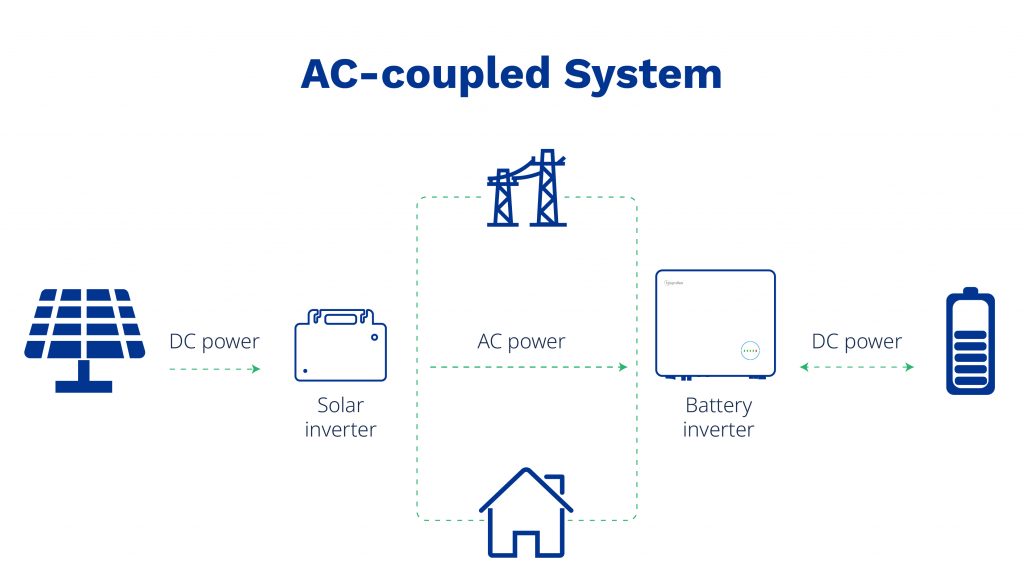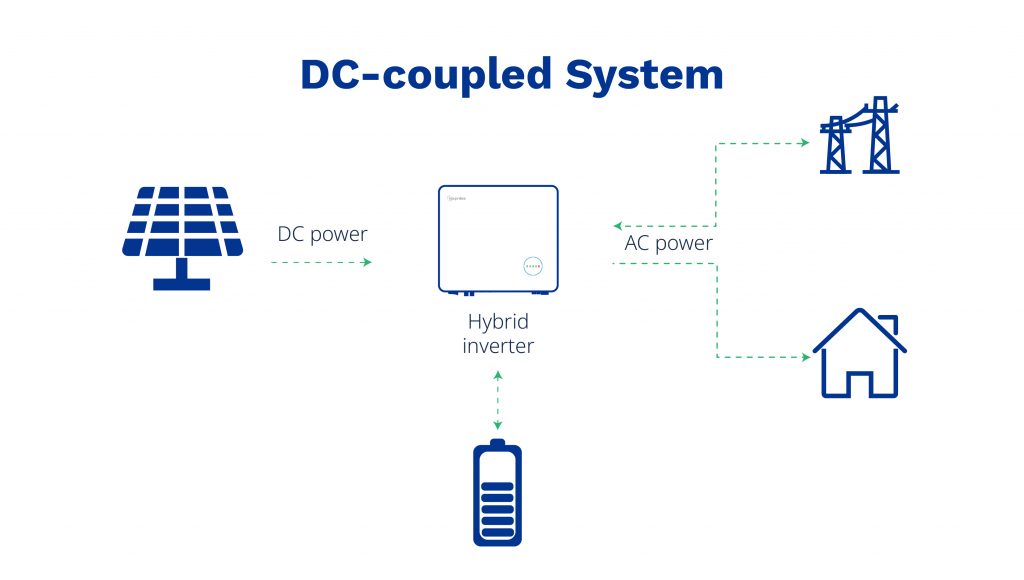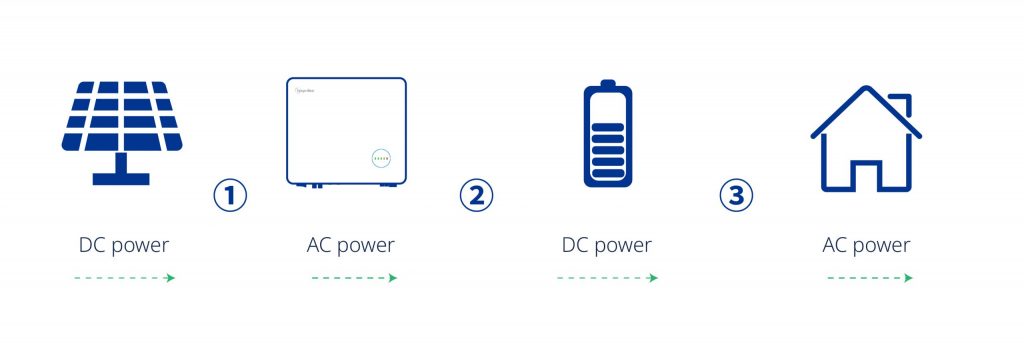AC-coupled and DC-coupled solar – what’s the difference?
- What is AC coupling?
- What is DC coupling?
- The 4 main solar battery system types
- How do AC coupling and DC coupling systems work
- What’s the difference between AC and DC coupling systems?
- Advantages of an AC-coupled system
- Advantages of a DC-coupled system
Solar power is more popular than ever, and incorporating an energy storage system into your solar setup is an excellent way to save money, reduce your carbon footprint, and get more reliable access to energy. DC-coupled and AC-coupled systems
can both help you achieve this, and each has different benefits and drawbacks depending on your specific situation. But what is AC and DC coupling?
Let’s take a look at the difference between AC- and DC-coupled solar systems, the benefits of each, and which you should choose for your property.
What is AC coupling?
In an AC-coupled solar system, solar panels produce DC power which flows into an inverter and is converted to AC to power appliances. Any electricity that is directed to a battery must be converted back to DC by an inverter, then converted back to AC when the battery discharges, either for powering appliances or feeding the main grid.

What is DC coupling?
In a DC-coupled solar system, DC power from the solar panels can be used to directly charge any solar batteries, with no intermediary conversion to AC. Any electricity needed to power appliances or feed the grid is converted to AC by an inverter, as is any electricity discharged from the battery.

The 4 main solar battery system types
System Type | Application | Features |
AC-Coupled Battery Systems (Grid-Tied) | Popular for grid-connected properties. | Enable quick and cost-effective addition of energy storage. |
DC-Coupled Hybrid Systems (Grid-Tied) | Offer high efficiency when charging batteries and using battery power. | High efficiency. |
DC-Coupled Systems (Off-Grid) | Ideal for small-scale setups like homes, motorhomes, and boats. | Efficient at charging batteries and powering DC appliances. |
AC-Coupled Systems (Off-Grid) | Suitable for large-scale off-grid setups. Efficient when powering high AC loads and can connect to a diesel generator. | Efficient for high AC loads; compatibility with diesel generators. |
How do AC coupling and DC coupling systems work
The solar panels in a photovoltaic (PV) array use the sun’s light to produce DC electricity. However, most household and many industrial appliances require AC power to function. Also, excess power can be fed into the grid in exchange for credits, and the grid uses AC. Therefore, electricity coming from solar panels must be converted to AC by an inverter before it is used or directed to the grid.
Batteries, on the other hand, require DC power for charging, and they output DC power when discharging. For this reason, an inverter is also needed when supplying a battery with AC power or when making use of the power from a discharging battery.
AC-coupled and DC-coupled solar systems work in similar ways to convert the electricity from AC to DC and vice versa depending on how it’s being used, but with a few key differences in the setup and equipment that’s used.
Let’s take a look at the basics of how each system works:
How does AC coupling work?
In an AC-coupled solar system, DC power coming from the solar panels is all converted to AC by an inverter. This is useful for powering appliances or feeding the main grid, but it must be converted back to DC power (using another inverter) in order to charge batteries. Additionally, electricity from discharging batteries must be converted to AC again. This means that electricity must be converted a total of three times when using battery power, and the system requires two inverters.

How does DC coupling work?
In a DC-coupled system, DC power from the solar panels can be directed straight to the system’s batteries (via a charge controller), without needing to pass through an inverter. Power for appliances or to feed the main grid is still converted to AC via an inverter, but this is the only inverter that’s needed. This makes DC-coupled systems simpler and, in general, more efficient than AC-coupled systems.

What’s the difference between AC and DC coupling systems?
When looking at DC-coupled vs AC-coupled systems, a major difference is that AC-coupled systems require two inverters – one to convert DC power from the solar panels into AC (for powering appliances and feeding the main grid), and another to charge batteries and make electricity from discharging batteries usable.
DC-coupled systems, however, only require one inverter. DC power from the solar panels is directed straight to the batteries, so it only needs to be converted once, to AC, to power appliances and feed the grid.
Another key difference when looking at AC-coupled vs DC-coupled systems is the requirement of a piece of equipment called a charge controller in DC-coupled systems. A charge controller essentially limits the amount of electricity entering your batteries in order to prevent overcharging and damage, making it an essential piece of equipment for any DC-coupled solar system.
Both systems have different advantages and disadvantages, so are more or less suited to different situations, but they are also mostly interchangeable and can provide similar levels of functionality. Ultimately, the choice of which system you should use will probably depend on pricing, whether you already have any solar equipment installed, and how much you value efficiency.
Below, we take a look at some of the main advantages of each type of setup to help you determine which is best for you.
Advantages of an AC-coupled system
Easier installation
AC-coupled systems are usually simpler to install, taking less time and therefore costing less overall.
Simpler upgrading
AC-coupled systems are generally the simplest option for anybody looking to upgrade an existing solar system to include energy storage. The installer will need to add some equipment, such as a hybrid inverter, but the main PV system will not need to be redesigned or rebuilt.
Advantages of a DC-coupled system
Efficiency (when using energy storage)
AC-coupled systems may be more efficient when you use the power from your solar panels immediately, but DC-coupled systems are significantly more efficient when you need to use your batteries. In a DC-coupled system, using power from your batteries requires a total of one change from DC to AC. In an AC-coupled system, power needs to be changed three times (from DC, to AC, to DC to charge the batteries, then back to AC to be used), meaning you lose significantly more energy in the process.
Direct battery charging
In a power outage, the batteries in an AC-coupled system can become depleted and shut down the entire system due to the complexity of the inverter setup. In a DC-coupled system, however, power from the solar panels can be used to directly charge the batteries, keeping the entire system functional until the grid power returns.
Full power utilization
AC-coupled systems usually use undersized inverters, as it is assumed the solar panels will rarely produce full output. In a DC-coupled system, the full capacity of your solar panels can be utilized by directing excess power to the batteries.
Additionally, in the case of DC coupling, the DC:AC ratio can be higher. In other words, for the same capacity of the PV array, you can use an inverter with a lower output without reducing the amount of electricity generated during the lifetime of the PV system. This can significantly improve the cost-effectiveness of the system.
Which solar plus storage system is best for your property?
While both AC- and DC-coupled solar systems are a great option for most people, there are a few things to consider when making your decision. One key factor is whether you already have solar panels installed and simply want to add energy storage functionality. If you do, an AC-coupled system is probably the best option, as it will generally be cheaper and faster to install.
If, however, you are installing a new solar system with energy storage from scratch, a DC-coupled system may be preferable due to the higher levels of efficiency you’re likely to enjoy. Over the lifetime of the system, this is likely to offset the slightly higher initial installation cost.
Hoymiles: Open energy for all
At Hoymiles, we produce a range of advanced, highly efficient solar inverters to help you build a solar system with energy storage capabilities.
We offer both AC-coupled solutions (which function both on and off the grid) and DC-coupled solutions. So whether you’re looking for the simplicity of an AC-coupled system or the efficiency of a DC-coupled system, you can always find the perfect inverter for your installation.
